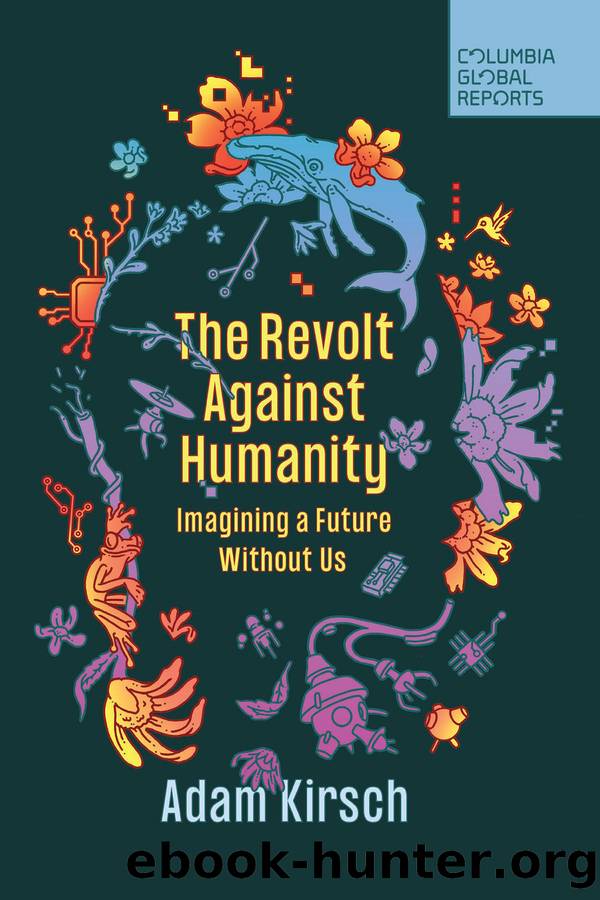The Revolt Against Humanity by Adam Kirsch

Author:Adam Kirsch
Language: eng
Format: epub
Publisher: Columbia Global Reports
A Throwing Away of All the Human Rules
Like antihumanists, transhumanists contemplate the prospect of humanityâs disappearance with serenity. What terrifies them is the possibility that it will happen too soon, before we have managed to invent our successors. As far as we know, humanity is the only intelligent species in the universe; if we go extinct, it may be game over for the mind. Itâs notable that while transhumanists are enthusiastic about space exploration, they are generally skeptical about the existence of extraterrestrial intelligence, or at least about the chances of our ever encountering it. If minds did exist elsewhere in the universe, the destiny of humanity would be of less cosmic significance.
Humanityâs sole stewardship of reason is what makes transhumanists interested in âexistential risk,â the danger that we will destroy ourselves before securing our future. In a 2002 paper, âExistential Risks: Analyzing Human Extinction Scenarios and Related Hazards,â Bostrom classifies such risks into four types, from âBangs,â in which we are completely wiped out by climate change, nuclear war, disease, or asteroid impacts, to âWhimpers,â in which humanity survives but achieves âonly a minuscule degree of what could have been achievedââfor instance, because we use up our planetâs resources too rapidly.
As for what humanity might achieve if all goes right, in The Precipice Ord writes that the possibilities are nearly infinite: âIf we can venture out and animate the countless worlds above with life and love and thought, then ⦠we could bring our cosmos to its full scale; make it worthy of our awe.â The idea of animating the cosmos may sound mystical or metaphorical, but for transhumanists it has a concrete meaning, captured in the term âcosmic endowment.âJust as a university can be seen as a device for transforming a monetary endowment into knowledge, so humanityâs function is to transform the cosmic endowmentâall the matter and energy in the accessible universeâinto âcomputronium,â a semi-whimsical term for any programmable, information-bearing substance.
Yuval Noah Harari refers to this idea as âDataism,â describing it as a new religion whose âsupreme valueâ is âdata flow.â âThis cosmic data-processing system would be like God,â he writes. âIt will be everywhere and will control everything, and humans are destined to merge into it.â Harari is highly skeptical of Dataism, and his summary of it may sound satirical or exaggerated. In fact, itâs a quite accurate account of the ideas of Ray Kurzweil, in particular.
In The Singularity Is Near, Kurzweil describes himself as a âpatternist,â that is, âsomeone who views patterns of information as the fundamental reality.â Examples of information patterns include DNA, semiconductor chips, and the letters on this page, all of which configure molecules so that they become meaningful instead of random. By turning matter into information, we redeem it from entropy and nullity. Ultimately, âeven the âdumbâ matter and mechanisms of the universe will be transformed into exquisitely sublime forms of intelligence,â Kurzweil prophesies.
In Superintelligence, Bostrom performs some back-of-the-envelope calculations and finds that a computer using the entire cosmic endowment as computronium could perform at least 1085 operations per second.
Download
This site does not store any files on its server. We only index and link to content provided by other sites. Please contact the content providers to delete copyright contents if any and email us, we'll remove relevant links or contents immediately.
The remains of the day by Kazuo Ishiguro(8949)
Tools of Titans by Timothy Ferriss(8347)
Giovanni's Room by James Baldwin(7301)
The Black Swan by Nassim Nicholas Taleb(7087)
Inner Engineering: A Yogi's Guide to Joy by Sadhguru(6776)
The Way of Zen by Alan W. Watts(6578)
Asking the Right Questions: A Guide to Critical Thinking by M. Neil Browne & Stuart M. Keeley(5741)
The Power of Now: A Guide to Spiritual Enlightenment by Eckhart Tolle(5725)
The Six Wives Of Henry VIII (WOMEN IN HISTORY) by Fraser Antonia(5486)
Astrophysics for People in a Hurry by Neil DeGrasse Tyson(5169)
Housekeeping by Marilynne Robinson(4420)
12 Rules for Life by Jordan B. Peterson(4292)
Double Down (Diary of a Wimpy Kid Book 11) by Jeff Kinney(4252)
The Ethical Slut by Janet W. Hardy(4232)
Skin in the Game by Nassim Nicholas Taleb(4224)
Ikigai by Héctor García & Francesc Miralles(4219)
The Art of Happiness by The Dalai Lama(4116)
Skin in the Game: Hidden Asymmetries in Daily Life by Nassim Nicholas Taleb(3973)
Walking by Henry David Thoreau(3939)
